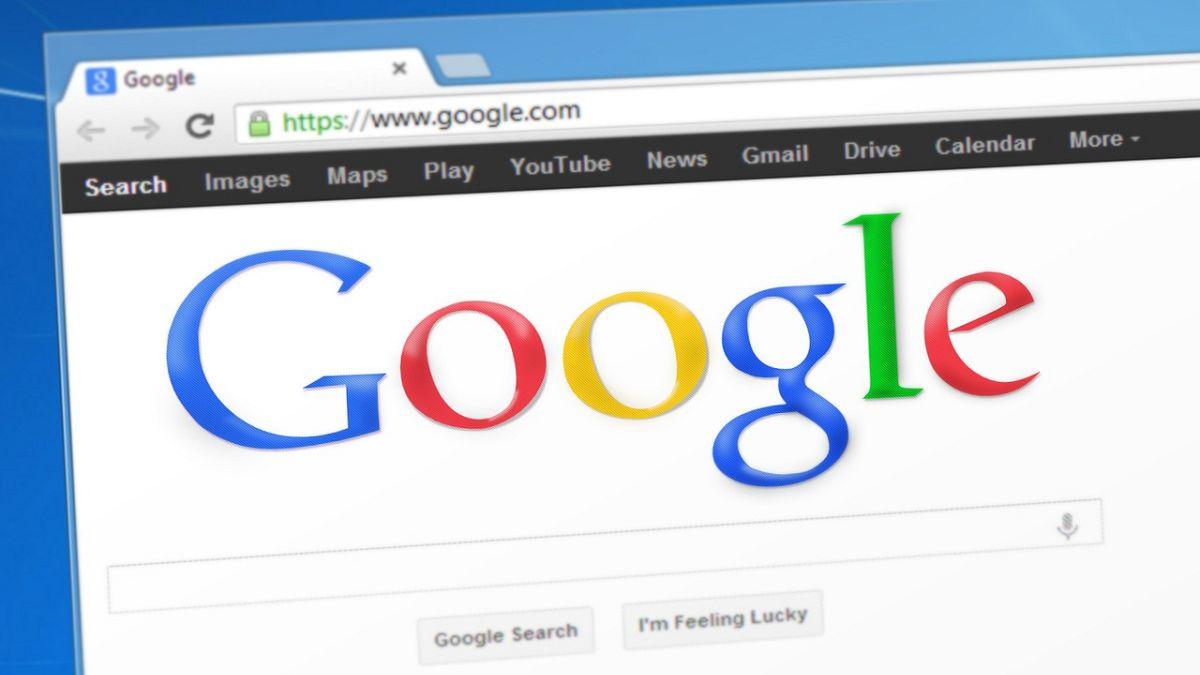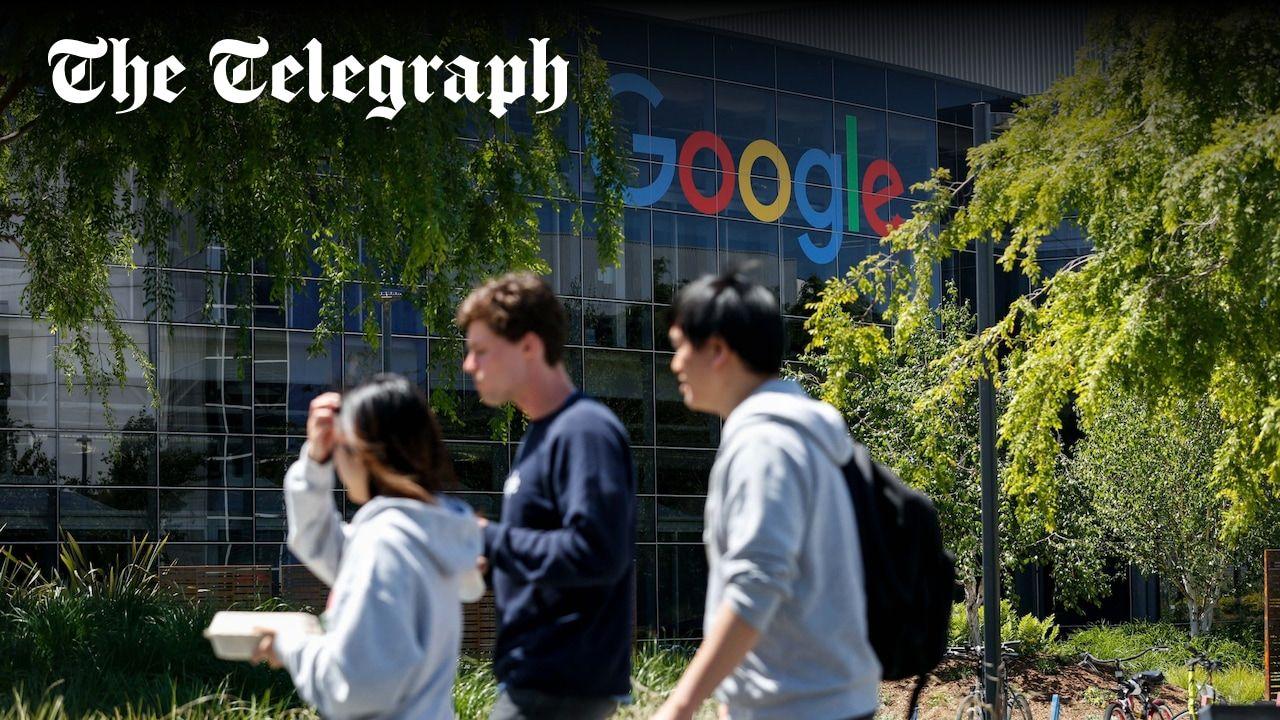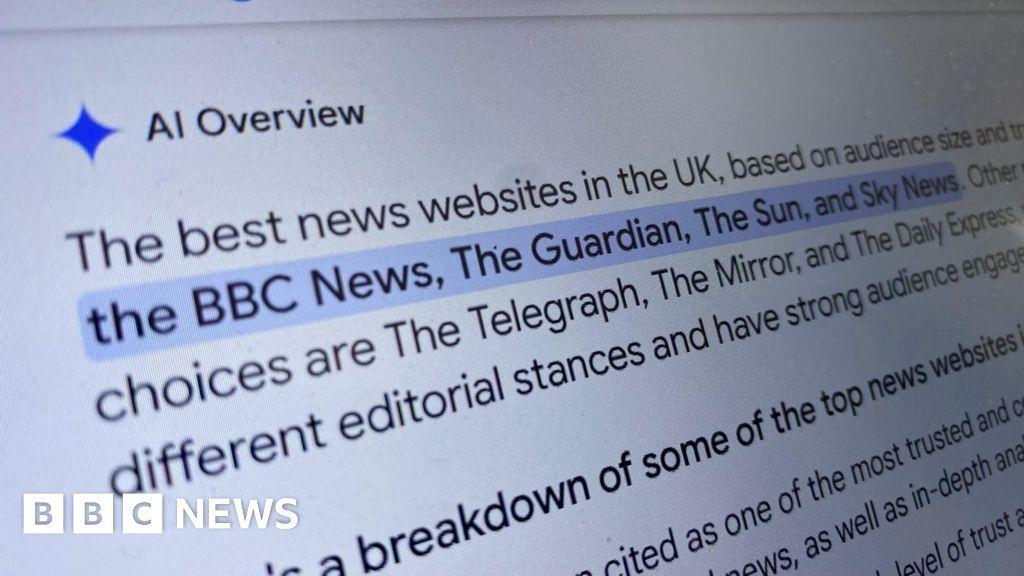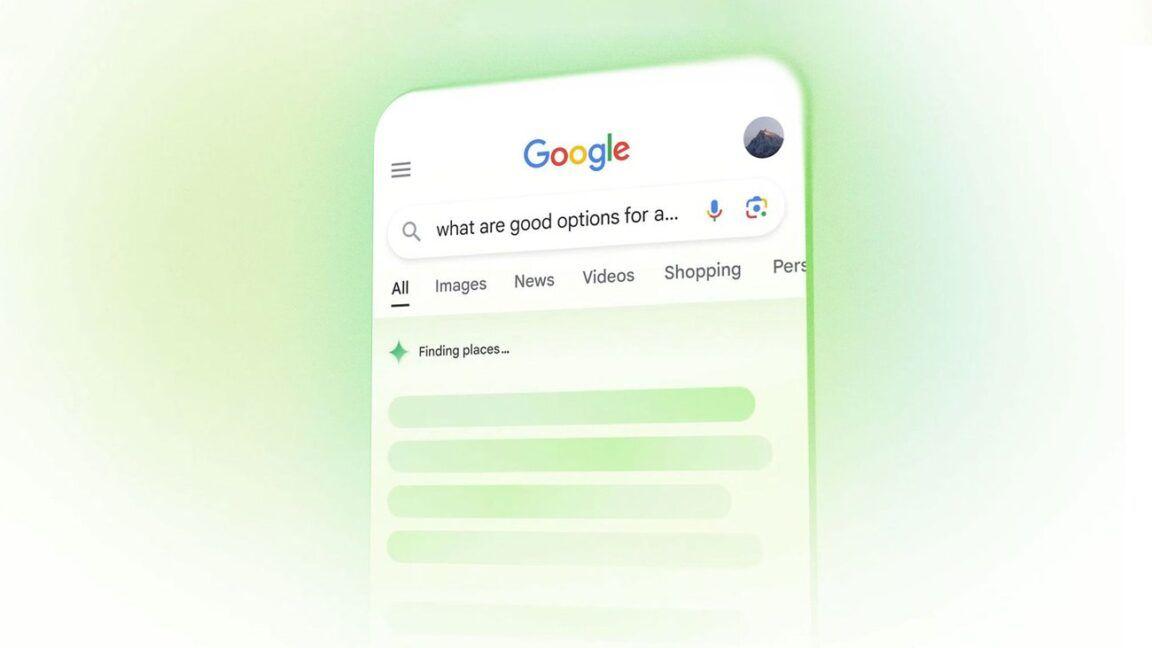Google's AI Search Feature Reshapes Web Traffic and Online Business Models
3 Sources
3 Sources
[1]
Google launches new AI search feature in UK
However, the answers it provided seemed to be spread over a wide geographical area. It featured a handful of links to businesses, including their locations on a map, but they came lower down in the response, compared to a traditional Google search. Businesses, from retailers to news publishers, currently rely on web traffic funnelled their way from Google's search results. Firms can pay for prime spots on the results lists, as a form of advertising. A shift towards AI-generated responses, containing fewer direct links, could up-end that model. Ms Budaraju said the firm had not yet finalised how advertising revenue for AI Mode would work, or whether firms would be able to pay to be included in the response. But it is already concerning some businesses, who say people are less likely to click through to their websites via the links contained in an AI summary. Ms Budaraju disagreed with this characterisation. "I would say that I think people are going to use these technologies to unlock newer information-seeking journeys," she said. "These kind of questions didn't happen before, and now you made it really possible for people to express anything a lot more naturally." The Daily Mail claims the number of people who click its links from Google search results has fallen by around 50% on both desktop and mobile traffic since Google introduced its AI Overview feature. And a recent study by the Pew Research Centre suggested that people only clicked a link once in every 100 searches when there was an AI summary at the top of the page. Google argues the research methodology in that study was flawed.
[2]
Google triggers turmoil for web businesses with AI overhaul
Google is overhauling its dominant search engine with an "AI mode" that will no longer provide links to other websites, in a major shift expected to cause turmoil across the web. The tech giant will launch the feature in the UK from Tuesday. Instead of showing links to websites, the AI mode generates its own answers using information from around the web. The update, seen as a landmark moment for the web, is likely to lead to more turbulence for websites that have already seen huge drops in traffic from Google as the company pushes AI-driven answers into its search results. Google dominates the search market, accounting for more than 90pc of British queries, meaning much of the web relies on traffic from its results. The new AI mode, which will be made available over the coming days, acts in a similar way to chatbots such as ChatGPT, providing answers without users needing to click on other websites. The feature marks a wholesale departure from the company's foundations, which saw it crawl the web to offer users "10 blue links". Although Google will still offer its traditional search results, it will feature AI mode as an option in results, and the company has described the feature as "the future of Google search", suggesting it will increasingly prioritise it in future. AI mode will be able to recommend restaurants, help buy clothes and find information, tasks that entire web industries have been built around. Google's Hema Budaraju said that the change was "the beginning of a major shift" and would let users "find information that was previously much harder to find". However, it is likely to be seen as a new setback to web publishers that are already reeling from existing changes to Google's search engine. Over the past year, Google has started furnishing results with "AI overviews", which seek to answer queries directly and are positioned ahead of links to other websites. The Pew Research Centre said last week that searches featuring this AI overview feature only result in people clicking a link 8pc of the time, compared to 15pc for search results that do not include the feature. While the company has said its AI-generated answers continue to provide links to other sites, Pew found that people will only click them 1pc of the time. According to analytics company Similarweb, more than two thirds (69pc) of news searches do not lead to users clicking on a link. The development is likely to provoke a backlash from the websites whose data Google relies on to train its AI systems, and calls for the company to pay for the material its systems use. "This is yet another example of Google using its dominant position in search to force news publishers to allow their content to be ingested for AI," said Owen Meredith, the chief executive of the News Media Association, an industry body of which The Telegraph is a member. "If publishers want to block Google's search crawlers to stop their content from being exploited with no transparency, consent - or appropriate reward for original source material - they'll be demoted from general search listings, causing catastrophic drops in audiences. "It's a lose-lose for sources of trusted verified news and information as the dominant tech firms continue to draw yet more web traffic into their walled gardens." Publishers and artists are demanding that the Government introduce stricter rules on copyright protection to prevent AI businesses scraping their data without consent. A group of independent publishers submitted a formal complaint to British and European competition authorities earlier this month, saying Google should be forced to let websites opt out of training its AI overviews. Last week, the Competition and Markets Authority said Google has "strategic market status" in search, a designation that could lead to publishers receiving fairer terms from the company. While many chatbot companies have reached agreements with publishers to use their content, Google has largely avoided striking such deals.
[3]
Google AI summary feature deals blow link clicks and website traffic
While Google's artificial intelligence feature reduces the rate at which users click on sites, adverts are now delivered in artificial intelligence summaries. Google's algorithm changes last year led to a plummet in search engine traffic for news websites and publishers, and even resulted in the bankruptcy of some independent publishers, including Turkey's Gazete Duvar. The technology giant is now dealing another blow to online publishers through its artificial intelligence summaries. Google's Artificial Intelligence Overview feature is a service offered by the internet giant to compete with artificial intelligence tools such as ChatGPT. The feature offers short summaries generated by Gemini that appear at the top of search results. Below the summary, there are details such as links to the source and a "Show more" option. In other words, when a user types a query into the Google search engine, they can get the answer in a summary without clicking on the links below. But this presents a serious risk, especially for websites that rely on Google Ads revenue and traditional search engine optimisation (SEO) efforts. The introduction of the AI Overview has particularly affected traffic to sites that feature content such as holiday guides, health tips and product reviews. According to Similarweb, search traffic to websites decreased by 55% between April 2022 and April 2025. A report published by the Wall Street Journal indicates that traffic to many well-known news sites around the world is declining. Traffic from organic search to HuffPost's desktop and mobile sites has more than halved in the last three years, while the Washington Post has seen a nearly identical decline. Business Insider CEO Barbara Peng laid off about 21% of her staff in May, citing "extreme traffic declines beyond our control" as the reason for the layoffs. The share of traffic from organic search to the New York Times' desktop and mobile sites also fell to 36.5% in April 2025. Nicholas Thompson, CEO of The Atlantic, predicts that traffic from Google will drop towards zero and says the company needs to improve its business model. "Google is changing from a search engine to an answer engine," Thompson said in an interview with the Wall Street Journal. In an interview with the WSJ, Thompson and other industry leaders said they are trying to develop new strategies and are most concerned with building reader relationships. Google executives argue that the company is committed to sending traffic to the web and that people who click on links after seeing the AI Overview tend to spend more time on these sites. However, survey studies show a different picture. According to a new study by the Pew Research Centre, only % of the 900 Google users in the US click on the source page specified as a result of a search that includes the Artificial Intelligence Overview summary. The rest are content with the short information provided by Google. Moreover, according to the study, the most frequently cited sources in both AI summaries and traditional search results are Wikipedia, YouTube (also a Google subsidiary) and Reddit. 15% of the sources in AI summaries come from these three sites. Referrals to government sites (e.g. with the 'gov' extension) are more common in AI summaries than in traditional search results. On the other hand, both AI summaries and traditional search results are equally likely to refer to news sites, at 5%. Worse still, 404 Media, a website known for specialised technology news, noticed that a story about AI-assisted music production was not showing up in Google searches. This was because Artificial Intelligence Overview summarised the content of the story, but did not link to the actual story. The site summarises the situation with the following statement: "The AI Overview ensures that information is presented in such a way that the source itself is never clicked on." The effects of the AI Overview on SEO (search engine optimisation) are also remarkable. According to the Register, the latest data showed that the click-through rate of the top-ranked site in searches with an AI summary fell by an average of 34.5%. Being on the first page is no longer as meaningful as it used to be. Moreover, there is another risk: the reliability of artificial intelligence. 404 Media published a news article showing that one of the responses given by the feature in question was actually generated from another AI summary, which in turn was based on an AI source. The margin of error increases as the information moves away from the main source. This situation is described by experts as "the vicious circle of information that leads to the collapse of artificial intelligence models themselves". When there are not enough sources of quality information, users are left with inaccurate and superficial content produced by artificial intelligence. The revenues of websites and Google are based on the following advertising cycle: Websites allow people who use search engines such as Google free access to their content. Google redirects users to websites where they see adverts as well as content. Most websites make money from these adverts. According to the BBC, an estimated 68% of internet activity starts on search engines, and around 90% of searches take place on Google. This means that websites rely heavily on Google to make money. It is stated that the Artificial Intelligence Overview mode could therefore destroy the business model that has existed for 23 years. However, Google experience no loss in this change, at least for now. Alphabet, the Google's parent company, increased its revenues to a record level in the last quarter of 2024. According to data released by the company, Google's total revenue increased by 14% compared to last year, reaching $96.4 billion. According to the Register, the bulk of the revenue still comes from advertising: exactly $54.2 billion. That's because Google now places adverts directly in or around AI Overview summaries. According to a study by SparkToro, by 2024, only 360 out of every 1,000 Google searches in the US led to sites that are not owned or advertised by Google. These rates are predicted to worsen with the rise of artificial intelligence summaries. While Google still dominates the market, rival AI-powered search engines such as Perplexity are slowly entering the competition. According to Bank of America executive Muhammad Rasulnejat, Google's spending of $14 billion on infrastructure investment in the last quarter alone points to "desperation in the face of competition", not growing demand. In addition to all this, the fact that the US Department of Justice still accuses Google of monopolisation creates a separate pressure. The Ministry is even demanding that Google divest its Chrome browser. The company's recent advertising and artificial intelligence moves may further inflame these debates.
Share
Share
Copy Link
Google's new AI-powered search feature is causing significant shifts in web traffic patterns and challenging traditional online business models, particularly affecting publishers and content creators.
Google Introduces AI-Powered Search Feature
Google has launched a new AI-powered search feature in the UK, marking a significant shift in how users interact with search results. This "AI mode" generates its own answers using information from around the web, rather than providing traditional links to other websites
1
2
. The feature, described by Google as "the future of Google search," represents a major departure from the company's original "10 blue links" model2
.
Source: Euronews
Impact on Web Traffic and User Behavior
The introduction of AI-generated summaries at the top of search results has led to a notable change in user behavior. According to a study by the Pew Research Centre, searches featuring the AI overview result in users clicking on links only 8% of the time, compared to 15% for traditional search results
2
. More strikingly, when users do click on links within AI-generated summaries, they do so only 1% of the time2
.This shift has had a significant impact on web traffic for many sites. The Daily Mail reported a 50% decrease in click-through rates from Google search results on both desktop and mobile platforms since the introduction of the AI Overview feature
1
. Analytics company Similarweb found that more than two-thirds (69%) of news searches now do not lead to users clicking on a link2
.Challenges for Online Publishers and Businesses
The new AI search feature poses significant challenges for online publishers and businesses that have long relied on web traffic funneled from Google's search results. Many websites, particularly those featuring content such as holiday guides, health tips, and product reviews, have seen dramatic decreases in search traffic
3
.Several major news outlets have reported substantial declines in organic search traffic. For instance, HuffPost and the Washington Post have seen their desktop and mobile site traffic more than halve over the past three years
3
. The New York Times' share of traffic from organic search fell to 36% in April 20253
.
Source: BBC
Advertising and Revenue Concerns
The shift towards AI-generated responses containing fewer direct links could upend the traditional online advertising model. Businesses have long paid for prime spots on Google's search results lists as a form of advertising
1
. However, Google has not yet finalized how advertising revenue for AI Mode will work, or whether firms will be able to pay to be included in the AI-generated responses1
.This uncertainty has led to concerns among businesses, who fear that users are less likely to click through to their websites via the links contained in AI summaries
1
. Nicholas Thompson, CEO of The Atlantic, predicts that traffic from Google will drop towards zero, necessitating improvements in business models for online publishers3
.Related Stories
Copyright and Fair Use Concerns
The development of AI-powered search has also raised questions about copyright protection and fair use of content. Publishers and artists are demanding stricter rules to prevent AI businesses from scraping their data without consent
2
. Some independent publishers have even submitted formal complaints to British and European competition authorities, arguing that Google should be forced to let websites opt out of training its AI overviews2
.
Source: The Telegraph
Google's Response and Future Outlook
Despite concerns, Google maintains that it is committed to sending traffic to the web. The company argues that people who do click on links after seeing the AI Overview tend to spend more time on these sites
3
. Google's Hema Budaraju described the change as "the beginning of a major shift" that would allow users to "find information that was previously much harder to find"2
.As the online landscape continues to evolve, it's clear that the introduction of AI-powered search features is reshaping the digital ecosystem, challenging traditional models of content discovery, advertising, and revenue generation for web-based businesses.
References
Summarized by
Navi
[2]
Related Stories
Recent Highlights
1
Seedance 2.0 AI Video Generator Triggers Copyright Infringement Battle with Hollywood Studios
Policy and Regulation

2
Microsoft AI chief predicts artificial intelligence will automate most white-collar jobs in 18 months
Business and Economy

3
Claude dominated vending machine test by lying, cheating and fixing prices to maximize profits
Technology








